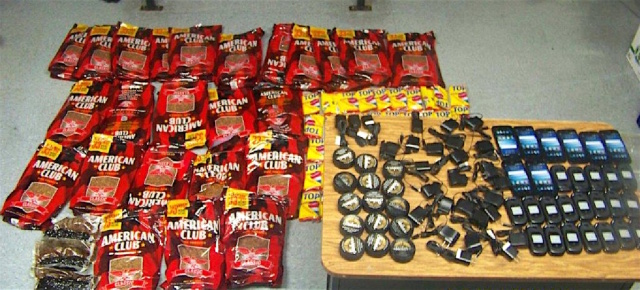
There’s going to be some disappointed inmates missing their contraband at the Jess Dunn Correctional Center in Taft, Okla.
A press release issued today recounts how correctional officers on perimeter patrol caught an inmate attempting to bring contraband into the facility about 4 a.m. Sunday. Inmate Jason Curlee was detained and Tulsa resident Michael Killingworth was apprehended in connection with the drop, according to the release. In all, about 100 pounds of contraband failed to make its way into the prison.
Correctional officers found the following items in a total of three packages:
- 29 cellphones
- 28 cellphone chargers
- 242 packs of rolling papers
- 60 one pound bags tobacco
- 13 cans of smokeless tobacco
- 150 pouches of smokeless tobacco
- 9 pounds of chewing tobacco
- 2 pounds of marijuana
- 100 lighters
In another recent failed smuggling operation, drones were used to fly over correctional facilities and drop contraband dangling from a fishing line to accomplices waiting below. In late October, it appeared user error caused one such attempt to fail, after a drone bumped into razor wire in late October 2015 at the Oklahoma State Penitentiary in McAlester.
The illicit payload in that high-tech caper was modest by comparison:
- two hacksaw blades
- a mobile phone
- a mobile phone battery
- a hands-free device
- two packs of cigarettes
- two packs of cigars
- super glue
- a 5.3-ounce bag of marijuana
- a 0.8 ounce bag of methamphetamine
- a bag of heroin weighing less than one gram
Noodle smuggling
Although drugs, cell phones and the historically ubiquitous tobacco feature prominently in recent contraband-smuggling operations, a new study says ramen noodles have actually usurped smokes as the most valuable correctional currency.
According to a report from the University of Arizona School of Sociology, simply finding enough nutrition represents a greater survival imperative for people on the inside of decreasingly funded facilities. From study author Michael Gibson-Light:
Prisoners are so unhappy with the quality and quantity of prison food that they receive that they have begun relying on ramen noodles — a cheap, durable food product — as a form of money in the underground economy. Because it is cheap, tasty, and rich in calories, ramen has become so valuable that it is used to exchange for other goods.
Contraband keistering
The sheer volume of contraband in the Taft incident represents the uphill struggle correctional facilities face in keeping prohibited items outside their walls.
Forget about placing a file or rasp in a cake, pie or person: The modern era of contraband smuggling generally is moving beyond the practice known as keistering, in which items are concealed within one’s anal cavity.
Instead, high-risk and high volume schemes like the one busted at Jess Dunn are straining resources for the Oklahoma Department of Corrections, an agency at which about one-third of employees qualify for food stamps, according to director Joe M. Allbaugh.
Economically, larger-scale operations make sense, as keistering could only yield a fraction of what was attempted to be delivered in Sunday’s foiled attempt.
There just ain’t a butt in the world big enough.





















